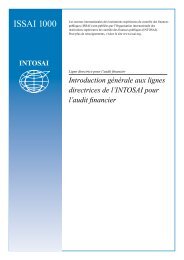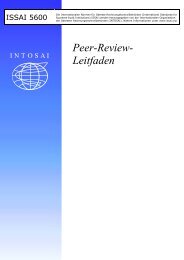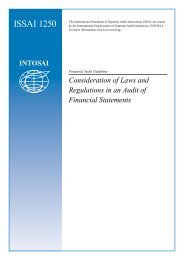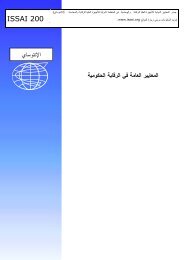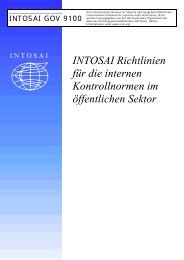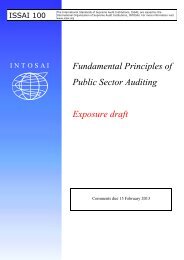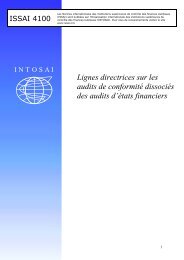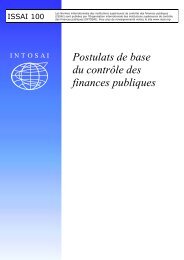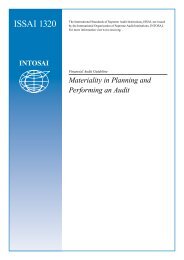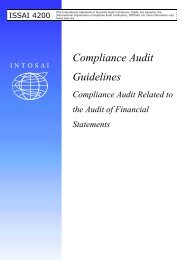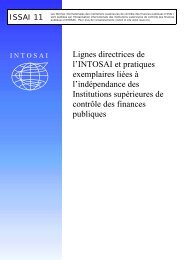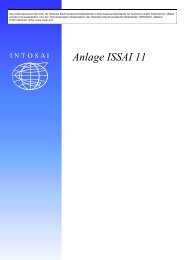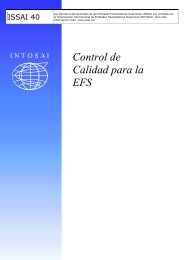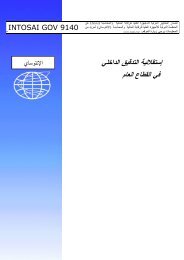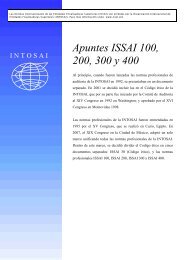ISSAI 1240
ISSAI 1240
ISSAI 1240
You also want an ePaper? Increase the reach of your titles
YUMPU automatically turns print PDFs into web optimized ePapers that Google loves.
<strong>ISSAI</strong> <strong>1240</strong><br />
ISA 240<br />
THE AUDITOR’S RESPONSIBILITIES RELATING TO<br />
FRAUD IN AN AUDIT OF FINANCIAL STATEMENTS<br />
Introduction<br />
Scope of this ISA<br />
1. This International Standard on Auditing (ISA) deals with the auditor’s<br />
responsibilities relating to fraud in an audit of financial statements.<br />
Specifically, it expands on how ISA 315 1 and ISA 330 2 are to be applied in<br />
relation to risks of material misstatement due to fraud.<br />
Characteristics of Fraud<br />
2. Misstatements in the financial statements can arise from either fraud or error.<br />
The distinguishing factor between fraud and error is whether the underlying<br />
action that results in the misstatement of the financial statements is intentional<br />
or unintentional.<br />
3. Although fraud is a broad legal concept, for the purposes of the ISAs, the<br />
auditor is concerned with fraud that causes a material misstatement in the<br />
financial statements. Two types of intentional misstatements are relevant to the<br />
auditor – misstatements resulting from fraudulent financial reporting and<br />
misstatements resulting from misappropriation of assets. Although the auditor<br />
may suspect or, in rare cases, identify the occurrence of fraud, the auditor does<br />
not make legal determinations of whether fraud has actually occurred. (Ref:<br />
Para. A1-A6)<br />
Responsibility for the Prevention and Detection of Fraud<br />
4. The primary responsibility for the prevention and detection of fraud rests with<br />
both those charged with governance of the entity and management. It is<br />
important that management, with the oversight of those charged with<br />
governance, place a strong emphasis on fraud prevention, which may reduce<br />
opportunities for fraud to take place, and fraud deterrence, which could<br />
persuade individuals not to commit fraud because of the likelihood of detection<br />
and punishment. This involves a commitment to creating a culture of honesty<br />
and ethical behavior which can be reinforced by an active oversight by those<br />
charged with governance. Oversight by those charged with governance<br />
includes considering the potential for override of controls or other<br />
inappropriate influence over the financial reporting process, such as efforts by<br />
management to manage earnings in order to influence the perceptions of<br />
analysts as to the entity’s performance and profitability.<br />
1<br />
2<br />
ISA 315, “Identifying and Assessing the Risks of Material Misstatement through Understanding the<br />
Entity and Its Environment.”<br />
ISA 330, “The Auditor’s Responses to Assessed Risks.”<br />
4<br />
The Auditor’s Responsibilities Relating to Fraud in an Audit of Financial Statements 239



